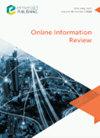How social are open-access debates: a follow-up study of tweeters' sentiments
IF 3.1
3区 管理学
Q2 COMPUTER SCIENCE, INFORMATION SYSTEMS
引用次数: 1
Abstract
PurposeDespite the widespread studies on the attitudes about OA, there exists little comparative evidence about the opinions of author and non-author parties at a global level in a social context. To bridge the gap, this study first investigated the opinions of the users who posted at least one tweet about OA in 2019. Then, it zoomed in to explore the views of the OA-interested tweeters, i.e. the users who have posted five or more tweets about OA.Design/methodology/approachUsing a content analysis method, with an opinion-mining approach, this study examined a sample of 9,268 OA-related tweets posted by 5,227 tweeters in 2019. The sentiments were analyzed using SentiStrength. A threshold of at least five tweets was set to identify the OA-interested tweeters.FindingsAcademics and scholars, library and information professionals, and journals and publishers were the main OA-interested tweeters, implying that OA debates have not been widely propagated from its traditional audience to the general public. Despite an overall positive attitude, the tweeters showed negative perspectives about the gold and hybrid models, validity and quality, and costs and funds. The negativity depended on the OA features tweeted, the tweeters' occupations and gender, as well as the trends.Research limitations/implicationsThe low societal impact of the OA debates calls for solutions to attract the public's attention and to exploit their potential to achieve the OA ideals. The OA stakeholders' divergence necessitates finding solutions to remedy the pitfalls. It also underlines the need for scrutiny into social layers when studying society's opinions and behaviors in a social network.Originality/valueThis is the first study in estimating the extent of the societal impact of OA debates, comparing the social OA stakeholders' opinions and their dependence on the OA features tweeted, the tweeter roles and gender and the tweet trending status.Peer reviewThe peer review history for this article is available at: https://publons.com/publon/10.1108/OIR-09-2022-0502开放获取辩论的社交性如何:对推特用户情绪的后续研究
尽管对开放获取的态度进行了广泛的研究,但在全球范围内,在社会背景下,关于作者和非作者的观点的比较证据很少。为了弥补这一差距,本研究首先调查了2019年发布至少一条关于OA的推文的用户的意见。然后,它放大来探索对OA感兴趣的推特用户的观点,即发布了五条或更多关于OA的推文的用户。本研究采用内容分析方法和意见挖掘方法,调查了5227名推特用户在2019年发布的9268条与oa相关的推文样本。使用SentiStrength分析这些情绪。设置了至少5条推文的阈值来识别对oa感兴趣的推特用户。学术和学者、图书馆和信息专业人士、期刊和出版商是对开放获取感兴趣的主要推特用户,这意味着开放获取辩论尚未从传统受众广泛传播到普通公众。尽管总体上持积极态度,但推特用户对黄金和混合模式、有效性和质量、成本和资金持负面看法。消极性取决于所发布的OA功能,推特者的职业和性别,以及趋势。研究局限/启示开放办公辩论的低社会影响需要解决方案来吸引公众的注意力,并利用他们的潜力来实现开放办公的理想。OA利益相关者的分歧需要找到解决方案来弥补缺陷。它还强调了在研究社交网络中的社会观点和行为时,对社会阶层进行审查的必要性。原创性/价值这是第一个估计OA辩论的社会影响程度的研究,比较了社会OA利益相关者的意见及其对OA特征的依赖,推特者的角色和性别以及推特趋势状态。同行评议本文的同行评议历史可在:https://publons.com/publon/10.1108/OIR-09-2022-0502
本文章由计算机程序翻译,如有差异,请以英文原文为准。
求助全文
约1分钟内获得全文
求助全文
来源期刊

Online Information Review
工程技术-计算机:信息系统
CiteScore
6.90
自引率
16.10%
发文量
67
审稿时长
6 months
期刊介绍:
The journal provides a multi-disciplinary forum for scholars from a range of fields, including information studies/iSchools, data studies, internet studies, media and communication studies and information systems.
Publishes research on the social, political and ethical aspects of emergent digital information practices and platforms, and welcomes submissions that draw upon critical and socio-technical perspectives in order to address these developments.
Welcomes empirical, conceptual and methodological contributions on any topics relevant to the broad field of digital information and communication, however we are particularly interested in receiving submissions that address emerging issues around the below topics.
Coverage includes (but is not limited to):
•Online communities, social networking and social media, including online political communication; crowdsourcing; positive computing and wellbeing.
•The social drivers and implications of emerging data practices, including open data; big data; data journeys and flows; and research data management.
•Digital transformations including organisations’ use of information technologies (e.g. Internet of Things and digitisation of user experience) to improve economic and social welfare, health and wellbeing, and protect the environment.
•Developments in digital scholarship and the production and use of scholarly content.
•Online and digital research methods, including their ethical aspects.
 求助内容:
求助内容: 应助结果提醒方式:
应助结果提醒方式:


